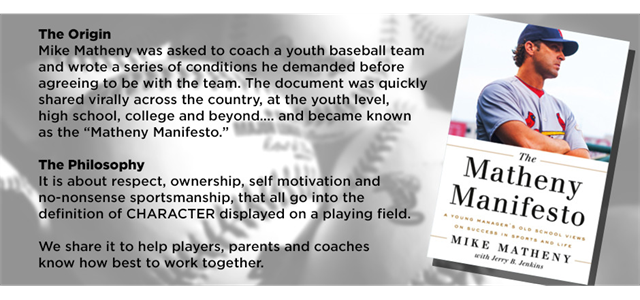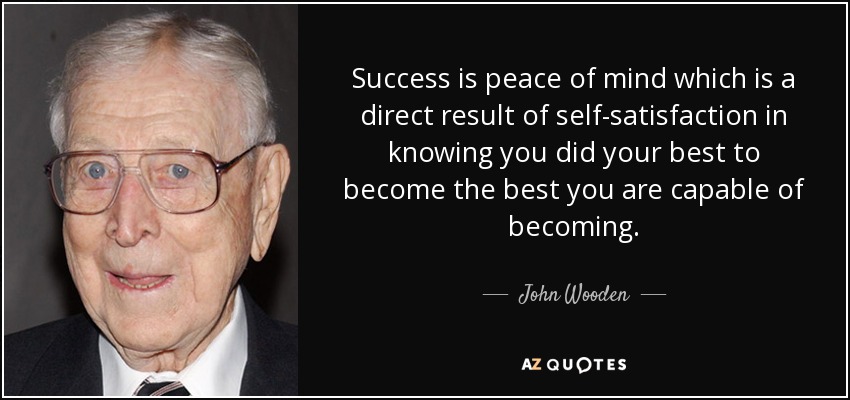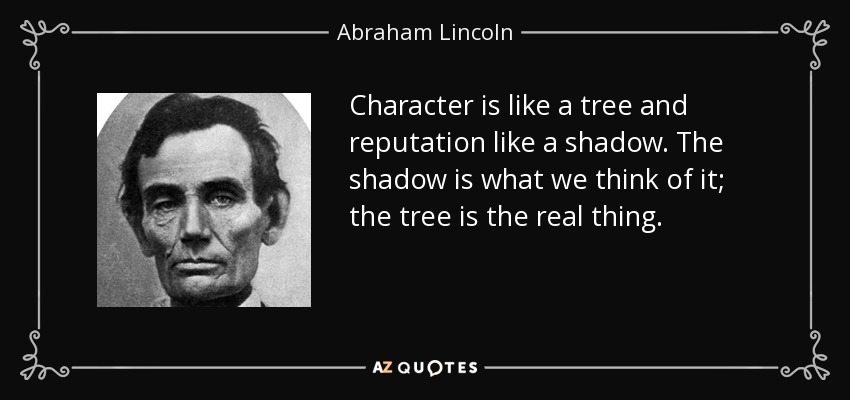Click here to return to Blog Post Intro

The Matheny Manifesto: A Young Manager’s Old-School Views on Success in Sports and Life
Matheny starts with his “nonnegotiables”:
- A baseball experience focused on the boys
- Baseball played the right way—with class
- Attitude, concentration, and effort (ACE)—factors the boys can control (with excellence required)
- Biblical truths as our moral compass
- A culture of respect from players, parents, and coaches
- An emphasis on the mental aspect of the game
- The players’ responsibility to make themselves better
- The parent’s role as a silent source of support (Matheny explained, “Somehow, the more organized sports became, the more they became about the parents and not about the kids. All of a sudden, kids didn’t seem to love sports as much as I did when I was their age—and that’s something I thought needed to change.”)
Matheny notes how he was influenced by Coach John Wooden (check out my post on Coach Wooden’s Leadership Game Plan for Success).
To Coach Wooden, it was all about character, the intangibles, doing the right things because they are the right things. Do that, and winning takes care of itself.
The Matheny Manifesto
Key #1: Leadership
The Coach Is Always Right–Even When He’s Wrong
Matheny notes that one of the greatest lessons his father taught him was that the coach was always right—even when he was wrong. That principle is a great life lesson about how things really work. Our culture has lost respect for authority, because kids hear their parents complain about teachers and coaches.
Besides parents, coaches are the earliest models of leadership kids have, so Matheny saw a big part of his job was to try to put each kid in positions where they could excel. The common goal is winning, but the focus is more on the team than on the individual.
Today, too many parents feel an obligation to defend their children even when they’re wrong. Parents have the right intentions—they want to stick up for their kids. But what are we teaching them if we don’t let them face their own difficulties? Life is tough, and people are going to mistreat them. We’re not always going to be there to hold their hands.
Matheny said he asks everyone in the game, from current players to Hall of Famers, “How did your parents act at your games?” Overwhelmingly, nearly unanimously, they told him they never heard a word from them.
How many Little Leaguers and teenage ballplayers can say that today?
Key #2: Confidence
Let Your Catcher Call the Game
When he played at the University of Michigan, Matheny distinctly recalls Coach Freehan yelling, “Quit looking at me! Your pitcher is waiting for you to give him a good suggestion!” That forever changed his philosophy on pitch-calling. Way too many youth, high school, and college coaches miss this important point. If you know how to call a great game from the bench, don’t do it. Instead, teach the guy who has the front-row view how to do it.
Coach Freehan and the University of Michigan produced a lot of big-league baseball players, but the vast majority of the guys on Freehan’s teams went on to other professions. Matheny believes they took this same philosophy into other disciplines and workplaces, because really, at its core it’s the epitome of knowing when and how to make confident decisions, and when to empower subordinates to make important ones for you.
Key #3: Teamwork
Don’t Think Less of Yourself, Think of Yourself Less
Matheny observes that organizations and coaches who emphasize winning at all costs win either only in the short run or not at all. But the ones who focus on the people, pursue perfection, strive for excellence, and emphasize getting the process right seem to also win the most over the long haul. They build great teams, and winning seems to follow.
Matheny recalls the kindness he experienced from future Hall of Famers, Robin Yount and Paul Molitor of the Milwaukee Brewers. He explains, “I can’t tell you how many times the memory of Molitor and Yount’s kindnesses prompted me to tell our youth-league kids that their generation can help bring back the lost art of simply being kind. It’s amazing how far this simple skill can take you and the impact it can have.”
One of the character studies Matheny conducted with the youth-team boys focused on standing up for what you believe in, emphasizing that they don’t need to force their opinions on others, but neither should they be afraid to defend their views, even when they aren’t popular. Derek Glanvill, president and chief operating officer at McCarthy Building Companies, Inc., is fond of quoting the maxim, “The right thing is seldom the easy thing.” Teammates will respect and appreciate that, even if they won’t admit it in front of others.
Darryl Kile was one of Matheny’s all-time favorite teammates because of his selflessness. Kile would pick out somebody to specifically encourage every day, other than the day before and the day he pitched. Selflessness is the goal—not thinking less of yourself, but thinking of yourself less. Make no mistake, developing that mind-set is not easy. It’s opposed by our culture and every fiber of our being. Instinct and billions of dollars in marketing tell kids to get what they can when they can, and do whatever they have to do to get it. But any team that allows selfishness to permeate its structure will fail.
Matheny encouraged the boys to figure out how to make everyone around them better, and the coaches tried to exemplify this. That means not overreacting to mistakes, which happen often. If the boys see coaches encourage in public and correct in private, they keep their dignity and the example is set.
Key #4: Faith
Stand Your Ground
Matheny explains that his Christian faith guides his life, and while he doesn’t force it down someone’s throat, he also believes it’s cowardly and hypocritical to shy away from what he believes. In his words, “I am, without apology, a Christian. With that comes an obligation, a responsibility to live up to who I say I am—or, more precisely, Whose I say I am. Religion is people’s idea of how to reach God. Jesus is God’s idea of how to reach people.”
Chris Bando—a devout Christian, who was Matheny’s AAA manager in New Orleans—kept his priorities straight, saying, “Good things can become bad things when they keep you from the best things.”
Key #5: Class
Respect the Ump– Even If He’s Blind
Matheny explains that coaches should resign themselves to the fact that by and large the umpiring at the lower levels is going to be bad, and set your team’s expectations accordingly. At the same time, bad umpiring is usually not intentional. In fact, it’s just a result of inexperience, and the guy is doing his best to learn and get better. This is the perfect opportunity to teach your kids compassion and, yes, class.
In fact, inconsistent officiating happens everywhere in every sport, and it’s not likely to change anytime soon. One of the best things an organization can do is to make it mandatory for all coaches, and as many parents as possible, to umpire a youth game, to see just how difficult it can be. We would all learn to be more tolerant. Regardless of whether you get that opportunity, imagine yourself in another person’s shoes—your boss, your spouse, your coworker—before you confront or criticize them. You may find that’s an accurate measure of your level of class—and character.
Key #6: Character
Stay in Your Lane
The final fifteen minutes of Matheny’s practices were devoted to character studies—covering topics like honesty, being a good teammate, hard work, and discipline. He would invite community leaders to prepare fifteen-minute topics of their choice, present them to the boys, and then open it up for discussion.
Matheny emphasized these core values that affect everything on and off the field:
- Service
- Teamwork
- Discipline
- Excellence
- Responsibility
Matheny emphasized to his coaches that they had a responsibility to the kids who wanted to get better and compete in an atmosphere of excellence. So, they further defined the culture they were trying to create. The boys needed to know that they could have fun but that the greatest rewards in life, truly having fun, involved hard work and self-sacrifice.
Key #7: Toughness
Nothing Worth Doing Right Is Easy
Matheny had heard—and parroted—all his life, “Nothing worth doing right is easy.” He observed that he had to live that out just so his counsel to the next generation would carry the ring of truth.
Matheny’s nickname, used by fans and broadcasters alike, was “The Toughest Man Alive,” after taking a 96 mph fastball in the face and playing the next day. Matheny explained, “If I could have avoided taking that fastball to the face, I would have, but the point was, it was the ninth inning, and I was trying to stay in there and fight. That’s what I urge coaches to teach today—from beginners to big leaguers. I don’t care if you’re a weak-hitting defensive specialist or leading the majors in RBIs. You’re up there to grind out every at bat.”
Now, that’s toughness…
Key #8: Humility
Seek Help When You Need It, Express Thanks When You Get It
Matheny studied the concept of servant leadership. If ever there was an example of a dichotomy, that’s one. The normal question is “What are you, a servant or a leader?” But the point of servant leadership is leading by serving.
The “upside-down organizational chart” concept intrigued him, and he decided that whatever career path he chose for the next season of his life following playing Major League Baseball would somehow include it. The leader, the boss, puts himself at the bottom, in a supporting role, and empowers his subordinates to excel. Somehow, he loses no power or authority or respect. In fact, his stature is enhanced because he has honored the people entrusted to him.
In his interview for the St. Louis Cardinals Managerial position to succeed the great Tony La Russa, Matheny described his view of the position this way, “You know, I think it’s about more than baseball. I think it’s about leadership.” The interview lasted three hours, but the time flew by. While he covered the expected baseball strategy and game situations, he really enjoyed discussing servant leadership and what that could mean to a team. He explained that he would surround himself with people who had expertise in areas he did not, because his goal would be to give the players the best opportunity to succeed.
Now, in his role as manager of the Cardinals, he doesn’t have lofty ideas about how many championships he needs to win. Instead, his job is to show leadership and impact people.
Matheny ends by saying, “I love this game, and every day I wake up praying it doesn’t rain, because that gives me one more chance to (1) teach someone to play the right way, (2) have a positive impact on them, and (3) do it with class. All I want to do is keep learning and growing and helping others do the same.”


